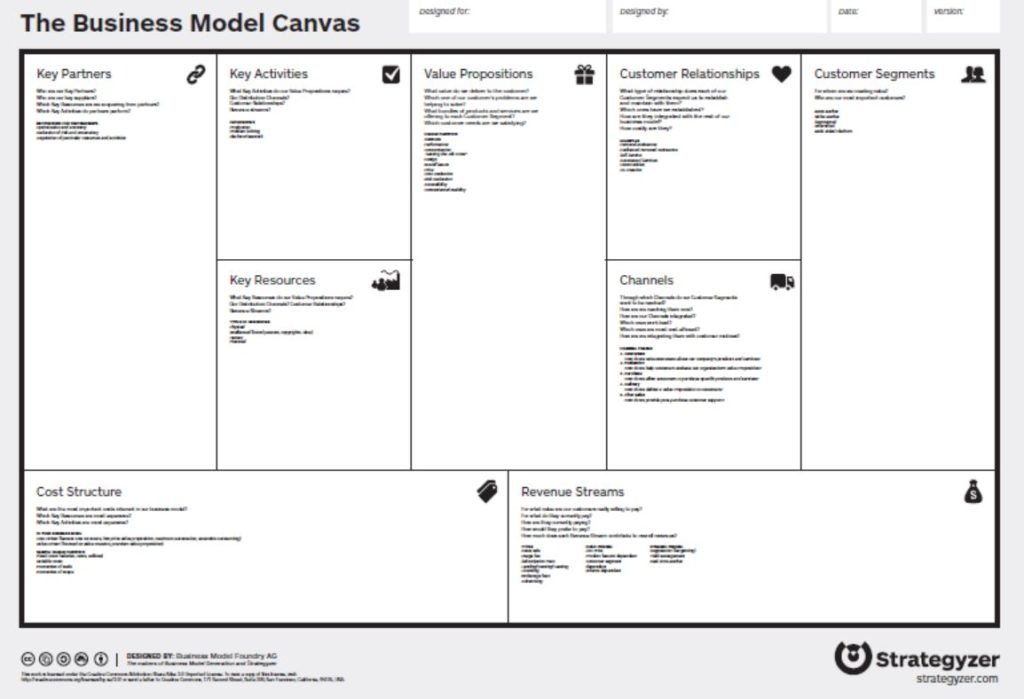By William Bland, co-founder of Learn2
The purpose of the Accelerate Cambridge – Enabling meaningful venture creation – is written on a poster in the coaching room. Hanadi insists on the word meaningful.
Last Friday, it was time for each of us to explain the purpose of our own ventures – in one simple sentence.
Surely, that’s easy? When you start out, don’t you know what you’re starting up?
The scheduled theme for the coaching session was “ The Business Model Canvas Workshop”, and the aim was to complete the business model canvas by the end of the day.

The model requires you to think through nine key elements of your business – the value proposition, customer segments, customer relationships, revenue streams, cost structure, key partners, key activities, channels and key resources.
When we arrived, there were two sets of tables in each room. In the middle of each set of tables, there were a dozen A3 copies of the business model canvas.
There were a couple of startups at each set of tables. So, we each had several copies of the business model canvas. We weren’t going to “get it right” first time.
A successful business is probably the only proof of “getting it right”, but there are many ways to get it wrong. If you can do that in four hours in a classroom – rather than four years in office – then so much the better.
One way to get it wrong – several of us were guilty of this – is to have a value proposition that no one else in the classroom understands.
It would have helped to if we had done our homework. “Entrepreneurs don’t do homework, right?”
As preparation, Hanadi had told us: write down your value proposition, find ten strangers, tell them what you’re offering and take note of what they say.
I thought to myself: we try to do that every day, but we call them “customers” not “strangers”. I was wrong – you need to talk to strangers too.
“Creating your value proposition will be one of the hardest things that you ever do,” Simon had warned us during the two-day MBA. It sounded like a challenge: “if it doesn’t hurt, you’re doing it wrong”
Thanks to Hanadi we found out that the search for value has a spiritual dimension: Ben & Jerry’s flavor funerals. Teams at the ice cream maker spend months to create an ice cream flavor that they think people will love. When the new flavours go to market, the world’s many ice cream eaters don’t necessarily love the same thing as the ice cream makers. Ice-cream flavour making teams need to come to terms that their product is not picking up and they need to “bury it” and move on.
Simon had also suggested that we might later require some funeral pyres on the River Cam in order to mark the passing of our business ideas.
Of course, the idea had sounded funny. You don’t associate startups with death.
It sounds much less funny a week later, after the Business Model Canvas workshop!
The most ambitious ventures strive to save lives – My Shelter’s luminous bottles for example – and every startup aspires to change people’s lives, even if it’s only the lives of the founders.
If nine in ten startups fail, does that mean that 90% of the people who create startups fail too? No, not if each person is ready to try ten different startups.


John Harper
Another fantastic blog post.
Don’t forget to keep coming back to your business canvas model and re-writing it every month or so. You may find, like me, that our start-ups can be much the same as a phoenix – bursting into flames and being reborn with a stronger (and clearer) value proposition each time.
Best of luck and see you around the offices.
Blaise Thomson
I found the business model canvas a really useful thinking tool! Looking forward to how this takes you with Rize.
Accelerate Cambridge
thank you for a “meaningful” blog!
Hanadi